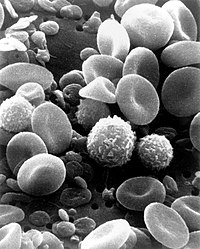
Photo from wikipedia
Despite considerable variation in disease manifestations observed among coronavirus disease 2019 (COVID‐19) patients infected with severe acute respiratory syndrome coronavirus 2, the risk factors predicting disease severity remain elusive. Recent… Click to show full abstract
Despite considerable variation in disease manifestations observed among coronavirus disease 2019 (COVID‐19) patients infected with severe acute respiratory syndrome coronavirus 2, the risk factors predicting disease severity remain elusive. Recent studies suggest that peripheral blood cells play a pivotal role in COVID‐19 pathogenesis. Here, we applied two‐sample Mendelian randomization (MR) analyses to evaluate the potential causal contributions of blood cell indices variation to COVID‐19 severity, using single‐nucleotide polymorphisms (SNPs) as instrumental variables for 17 indices from the UK Biobank and INTERVAL genome‐wide association studies (N = 173 480). Data on the associations between the SNPs and very severe respiratory confirmed COVID‐19 were obtained from the COVID‐19 host genetics initiative (N = 8779/1 001 875). We observed significant negative association between hematocrit (HCT; odds ratio, OR = 0.775, 95% confidence interval, CI = 0.635–0.915, p = 3.48E−04) or red blood cell count (OR = 0.830, 95% CI = 0.728–0.932, p = 2.19E−03) and very severe respiratory confirmed COVID‐19, as well as nominal negative association of hemoglobin concentration (OR = 0.808, 95% CI = 0.673–0.943, p = 3.95E−03) with very severe respiratory confirmed COVID‐19 (no effect survived multiple correction). In conclusion, the MR study supports a protective effect of high HCT and red blood cell count from very severe respiratory confirmed COVID‐19, suggesting potential strategies to ameliorate/treat clinical conditions in very severe respiratory confirmed COVID‐19.
Journal Title: Journal of Medical Virology
Year Published: 2022
Link to full text (if available)
Share on Social Media: Sign Up to like & get
recommendations!